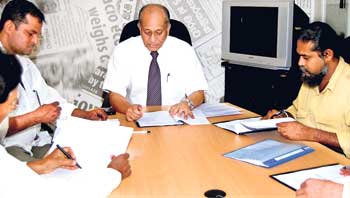Four major media organisations this week reaffirmed their commitment to the 1998 Colombo Declaration on Media Freedom and Social Responsibility following an international seminar that was held in October last year to re-visit the Charter.
The Newspaper Society of Sri Lanka, The Editors' Guild of Sri Lanka, the Free Media Movement and the Sri Lanka Working Journalists Association were the joint signatories to the Colombo Declaration of 1998, the Media Charter upon which the country's publishers, editors, journalists and media activists have based their campaigns for an independent and responsible press in Sri Lanka. UNESCO and several international media associations support the initiative.
Some of the highlights of the provisions of the revised Colombo Declaration are to acknowledge the positive developments since 1998. These include the repeal of the criminal defamation laws, the repeal of the 1978 amendments to the Parliamentary (Powers and Privileges) Act of 1953, the appointment of a Parliamentary Select Committee to draft a Contempt of Court Act, and the drafting of a Freedom of Information Bill in 2004, and also, the establishment of the Sri Lanka Press Institute, the Press Complaints Commission of Sri Lanka, and the Sri Lanka College of Journalism.
 |
| Strength in unity: The revised Colombo Declaration on Media Freedom and Social Responsibility was signed last Wednesday by Ranjit Wijewardene (Newspaper Society), Uvindu Kurukulasuriya (Free Media Movement), Sanath Balasuriya (Sri Lanka Working Journalists Association), and Sinha Ratnatunga (Editors' Guild). Kumar Nadesan, Chairman of the Sri Lanka Press Institute was also present. |
The revised Colombo Declaration of 2008 also accepted UNESCO's Windhoek Declaration that asserts that the right to a free press as a fundamental right of the people, and recognised the fact that the Sri Lankan Government is a signatory to the Colombo Declaration on Media, Development and Poverty Eradication which includes the promotion of a free, pluralistic and independent media committed to social justice and development.
The 2008 Declaration states that the media cannot operate freely under the constant condition of fear, and urged the Government to permit journalists to practise their profession as provided for in the Constitution in safety and security.
The signatories call for a Right to Information Act, on the lines of the Freedom of Information Bill approved by Cabinet in 2004 to reflect principles of transparency and open Government. They agree to lobby for a Contempt of Court Act, and to ensure that all regulations made under the Public Security Ordinance (1947) be subject to statutorily stipulated tests of necessity and/or expediency and/or proportionality.
Arrests made under emergency law should be made on objective grounds that the arrest is justified in law and not on vague or general suspicion, reasons should be given for the arrest and the person arrested should be brought promptly before the nearest court.
The 2008 Declaration calls for exorbitant duties imposed on newsprint imports which act as deterrents to the dissemination of information and education be brought to a zero rate of duty, and urged world newsprint producing cartels to take into consideration the problems faced by newspaper publishers of the smaller countries that are compelled to increase the cover prices of newspapers due to high costs of imported newsprint.
The Declaration calls for all State funded and managed broadcasting services in Sri Lanka be converted to publicly-owned bodies devoid of State control, and to recognise new media, especially bloggers. It calls upon the Government to recognise the Internet as an important space for deliberative democracy, and to extend to it, all such policies as would enhance this space for free speech, and to avoid all policies of banning, blocking, or censoring websites without reasonable grounds.
It calls upon all journalists to protect their sources and to abide by the Code of Professional Practice (Code of Ethics) of the Editors‘ Guild, and to co-operate swiftly with the self-regulatory Press Complaints Commission.
Publishers have been urged to improve the working conditions and safety conditions for journalists; to recognise the need for raising the professional standards of working journalists. | 
